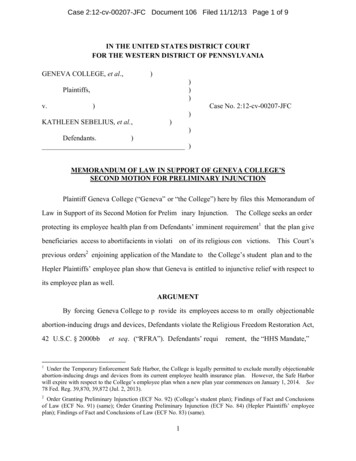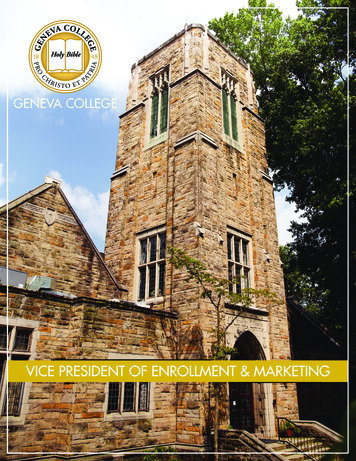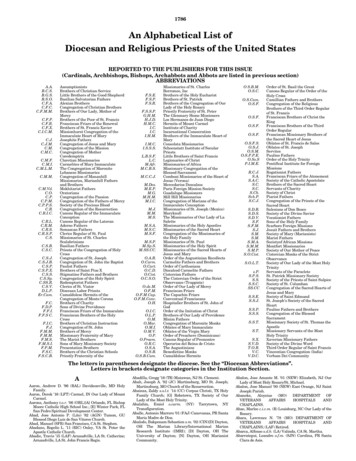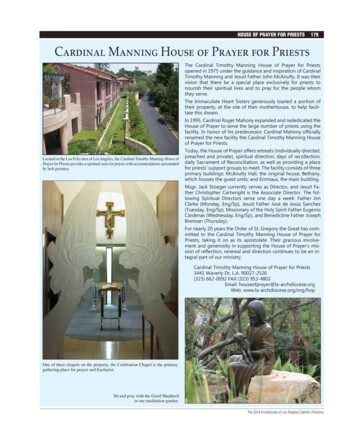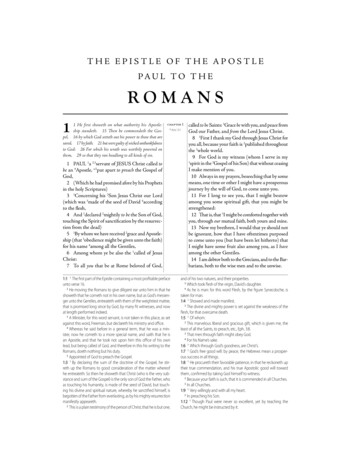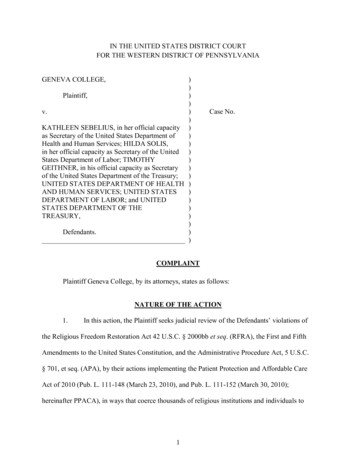
Transcription
IN THE UNITED STATES DISTRICT COURTFOR THE WESTERN DISTRICT OF PENNSYLVANIAGENEVA COLLEGE,))Plaintiff,))v.))KATHLEEN SEBELIUS, in her official capacity )as Secretary of the United States Department of)Health and Human Services; HILDA SOLIS,)in her official capacity as Secretary of the United )States Department of Labor; TIMOTHY)GEITHNER, in his official capacity as Secretary )of the United States Department of the Treasury; )UNITED STATES DEPARTMENT OF HEALTH )AND HUMAN SERVICES; UNITED STATES)DEPARTMENT OF LABOR; and UNITED)STATES DEPARTMENT OF THE)TREASURY,))Defendants.))Case No.COMPLAINTPlaintiff Geneva College, by its attorneys, states as follows:NATURE OF THE ACTION1.In this action, the Plaintiff seeks judicial review of the Defendants’ violations ofthe Religious Freedom Restoration Act 42 U.S.C. § 2000bb et seq. (RFRA), the First and FifthAmendments to the United States Constitution, and the Administrative Procedure Act, 5 U.S.C.§ 701, et seq. (APA), by their actions implementing the Patient Protection and Affordable CareAct of 2010 (Pub. L. 111-148 (March 23, 2010), and Pub. L. 111-152 (March 30, 2010);hereinafter PPACA), in ways that coerce thousands of religious institutions and individuals to1
engage in acts they consider sinful and immoral in violation of their most deeply held religiousbeliefs.2.Plaintiff Geneva College is a Christ-centered institution of higher learning. Assuch, it believes that God, in His Word, has condemned the intentional destruction of innocenthuman life. The College’s leaders believe, as a matter of religious faith, that it would be sinfuland immoral for Geneva intentionally to participate in, pay for, facilitate, or otherwise supportabortion, which destroys human life. They believe that the Sixth Commandment (“thou shaltnot murder”) proscribes payment for and facilitation of the use of drugs that can and do destroyvery young human beings in the womb.3.With full knowledge that many religious organizations hold the same or similarbeliefs, the government Defendants issued regulations that, by forcing them to pay for andotherwise facilitate the use of abortifacient drugs and related education and counseling, trampleon the freedom of Geneva College and millions of other American organizations and individualsto abide by their religious convictions, to comply with moral imperatives they believe aredecreed by God Himself.4.The regulation—the HHS Preventive Services Mandate—illegally andunconstitutionally coerces Geneva College to violate the Sixth Commandment under threat ofheavy fines and penalties. The Mandate also forces the College to fund government-dictatedspeech that is directly at odds with the religious message it wishes to convey to its students andto the broader culture.5.Defendants’ refusal to accommodate conscience in this matter is highly selective.Upon information and belief, the government has provided thousands of exemptions from thePPACA for various groups, such as large corporations, but the government refuses to exemptmost religious groups from this unprecedented Mandate.2
6.Defendants’ actions violate Geneva College’s right freely to exercise its religion,protected by the Religious Freedom Restoration Act and the Religion Clauses of the FirstAmendment to the United States Constitution.7.Defendants’ actions also violate Geneva College’s right to the freedom of speech,as secured by the Free Speech Clause of the First Amendment to the United States Constitution,and due process rights secured by the Fifth Amendment to the United States Constitution.8.Additionally, Defendants violated the Administrative Procedure Act, 5 U.S.C.§ 553, by imposing the Mandate without prior notice or public comment, and for other reasons.9.Defendants knew, in imposing their Mandate, that it would coerce thousands ofindividuals and organizations like Geneva College to violate their religious convictions. TheCollege seeks declaratory and injunctive relief to protect against this deliberate attack.IDENTIFICATION OF PARTIES AND JURISDICTION10.Plaintiff Geneva College is a Christ-centered institution of higher learning locatedin Beaver Falls, Pennsylvania. It is a Pennsylvania not-for-profit corporation.11.Defendants are appointed officials of the United States government and UnitedStates Executive Branch agencies responsible for issuing and enforcing the Mandate.12.Defendant Kathleen Sebelius is the Secretary of the United States Department ofHealth and Human Services (HHS). In this capacity, she has responsibility for the operation andmanagement of HHS. Sebelius is sued in her official capacity only.13.Defendant HHS is an executive agency of the United States government and isresponsible for the promulgation, administration and enforcement of the Mandate.14.Defendant Hilda Solis is the Secretary of the United States Department of Labor.In this capacity, she has responsibility for the operation and management of the Department ofLabor. Solis is sued in her official capacity only.3
15.Defendant Department of Labor is an executive agency of the United Statesgovernment and is responsible for the promulgation, administration, and enforcement of theMandate.16.Defendant Timothy Geithner is the Secretary of the Department of the Treasury.In this capacity, he has responsibility for the operation and management of the Department.Geithner is sued in his official capacity only.17.Defendant Department of Treasury is an executive agency of the United Statesgovernment and is responsible for the promulgation, administration, and enforcement of theMandate.18.This action arises under the Constitution and laws of the United States. TheCourt has subject matter jurisdiction pursuant to 28 U.S.C. §§ 1331 & 1361, jurisdiction torender declaratory and injunctive relief under 28 U.S.C. §§ 2201 & 2202, 42 U.S.C. § 2000bb-1,5 U.S.C. § 702, and Fed. R. Civ. P. 65, and to award reasonable attorney’s fees and costs underthe Equal Access to Justice Act, 28 U.S.C. § 2412, and 42 U.S.C. § 1988.19.Venue lies in this district pursuant to 28 U.S.C. § 1391(e). A substantial part ofthe events or omissions giving rise to the claim occurred in this district, and the Plaintiff islocated in this district.FACTUAL ALLEGATIONSI.Geneva College’s Religious Beliefs and Provision of Educational Services in General20.Geneva College was established in 1848 by the Reformed Presbyterian Church ofNorth America (RPCNA). The College’s mission is to glorify God by educating andministering to a diverse community of students in order to develop servant-leaders who willtransform society for the kingdom of Christ.4
21.The College pursues this mission through biblically-based programs and servicesanchored in the historic, evangelical, and Reformed Christian faith. The vocationally-focusedcurriculum is rooted in the liberal arts and sciences and is delivered through traditional andspecialized programs.22.Central to the mission of Geneva College is its desire to glorify God. TheCollege believes that the Bible teaches that the lives of all people (especially followers of JesusChrist) should glorify God. The College embraces the oft-quoted statement of the WestminsterShorter Catechism: “Man’s chief end is to glorify God and enjoy Him forever.”23.Geneva College believes that one of its central purposes is “to see the glory ofGod in all the aspects of His Word and world. This is furthered by having students, facultyand, ultimately, the whole of academe see the glory that is God’s in His creation, deeds,disciples and, above all, in His son, the Lord of Glory.”24.Geneva College follows the creedal commitment in the application to many of itspolicies and practices that flow from the Reformed Presbyterian Church of North America.That commitment is derived from the Holy Bible and is articulated in the WestminsterConfession of Faith, the Westminster Larger and Shorter Catechisms, and the Testimony of theRPCNA.25.Members of Geneva’s Board of Corporators, which governs the College, must bemembers in good standing of the Reformed Presbyterian Church of North America. The Synodof the RPCNA elects all members of the Board of Corporators. The Board of Corporatorsexercises control for the RPCNA over the purpose, policies, and property of the College.26.A Board of Trustees operates Geneva College under authority delegated by theBoard of Corporators. Trustees must be members of either the RPCNA or other Reformed andEvangelical Christian congregations.5
27.Geneva College draws its faculty, staff, and administration from among thosewho profess faith in Christ and otherwise agree with the College’s Christian convictions.28.Although the College does not require a profession of faith as a prerequisite forstudent admission, it does give priority in its recruitment to the evangelical Christiancommunity and seeks to create a Christian peer influence among students. All students areexpected to live by the standards of historic Christian morality, including those expressed in theTen Commandments.29.Geneva College has a long history of providing education to individuals fromsegments of society that have been disenfranchised. In the years following the EmancipationProclamation of 1863, a significant percentage of the students were freed black slaves. Genevawas among the earliest schools to matriculate women to a full degree program. The College isbuilding on that history through special efforts to recruit and retain African-American, Latino,other minority, and international students, believing that its student body should reflect thediversity of our world.30.At certain points in its history, Geneva has found it necessary to engage in civildisobedience of unjust laws. In the 1860s, Geneva College was a station on the UndergroundRailroad, which sought, against the law of the land, to hide and transport escaped slaves. TheCollege believed that the institution of slavery was inimical to biblical faith.31.The College’s current enrollment is approximately 1,850.32.The College has approximately 350 employees, and about 280 of them arefull-time. There are approximately 95 full-time faculty members.II.The Religious Beliefs of Geneva College and of the Reformed Presbyterian Churchof North America Regarding Abortion33.The RPCNA Testimony, one articulation of the Church’s religious beliefs,declares as follows: “Unborn children are living creatures in the image of God. From the6
moment of conception to birth they are objects of God’s providence as they are being preparedby Him for the responsibilities and privileges of postnatal life. Unborn children are to betreated as human persons in all decisions and actions involving them. Deliberately inducedabortion, except possibly to save the mother’s life, is murder.”34.In support of this declaration, the Testimony cites Exodus 20:13 (the SixthCommandment, “thou shalt not murder”), Exodus 21:22-23, and Psalm 139:13-16, all of whichthe College believes are part of the inerrant and infallible Word of God.35.The Westminster Larger Catechism, another articulation of the Church’s beliefs,sets forth the duties required by the Sixth Commandment. These include “all careful studies,and lawful endeavors, to preserve the life of ourselves and others by resisting all thoughts andpurposes, subduing all passions, and avoiding all occasions, temptations, and practices, whichtend to the unjust taking away the life of any . . . and protecting and defending the innocent.”In support of this statement, the Larger Catechism cites the following Scripture verses: Eph.5:28-29; 1 Kings 18:4; Jer. 26:15-16; Acts 23:12, 16-17, 21, 27; Eph. 4:26-27; 2 Sam. 2:22;Deut. 22:8; Matt. 4:6-7; Prov. 1:10-11, 15-16; 1 Sam. 24:12; 1 Sam. 26:9-11; Gen. 37:21-22;Ps. 82:4; Prov. 24:11-12; 1 Sam. 14:45; Jas. 5:7-11; Heb. 12:9; 1 Thess. 4:11; 1 Pet. 3:3-4; Ps.37:8-11; Prov. 17:22; Prov. 25:16, 27; 1 Tim. 5:23; Isa. 38:21; Ps. 127:2; Eccl. 5:12; 2 Thess.3:10, 12; Prov. 16:26; Eccl. 3:4, 11; 1 Sam. 19:4-5; 1 Sam. 22:13-14; Rom. 13:10; Luke10:33-34; Col. 3:12-13; Jas. 3:17; 1 Pet. 3:8-11; Prov. 15:1; Judg. 8:1-3; Matt. 5:24; Eph. 4:2,32; Rom. 12:17, 20-21; 1 Thess. 5:14; Job 31:19-20; Matt. 25:35-36; and Prov. 31:8-9.36.The Westminster Larger Catechism also identifies “the sins forbidden in the sixthcommandment.” Among these are “all taking away the life of ourselves, or of others, except incase of public justice, lawful war, or necessary defence; the neglecting or withdrawing thelawful and necessary means of preservation of life; . . . and whatsoever else tends to the7
destruction of the life of any.” In support of this statement, the Larger Catechism cites thefollowing Scripture verses: Acts 16:28; Gen. 9:6; Num. 35:31, 33; Jer. 48:10; Deut. 20:1-20;Ex. 22:2-3; Matt. 25:42-43; Jas. 2:15-16; Eccl. 6:1-2; Matt. 5:22; 1 John 3:15; Lev. 19:17; Prov.14:30; Rom. 12:19; Eph. 4:31; Matt. 6:31, 34; Luke 21:34; Rom. 13:13; Eccl. 12:12; Eccl.2:22-23; Isa. 5:12; Prov. 15:1; Prov. 12:18; Ezek. 18:18; Ex. 1:14; Gal. 5:15; Prov. 23:29; Num.35:16-18, 21; and Ex. 21:18-36.37.The Foreword to a recent re-issue of the 1888 History of the ReformedPresbyterian Church in America observes that the Testimony “has been updated to keep pace.”As an example, the Foreword states that “[t]he Church of 1888 did not make reference to willfulabortion, as that was not an issue. Today, however, abortion is one of the most dynamic socialcontroversies, and we should praise God that he has enabled this church to maintain a testimonyagainst such murder.”38.Geneva College unreservedly shares the RPCNA’s religious views regardingabortion, believing that the procurement, participation in, facilitation of, or payment for abortion(including abortion-causing drugs like Plan B and ella) violates the Sixth Commandment and isinconsistent with the dignity conferred by God on creatures made in His image.39.By “conception,” “pregnancy,” “abortion” and related concepts referenced hereinregarding the sanctity of innocent human life and prohibitions on its destruction, GenevaCollege understands such concepts to recognize and protect the lives of human beings from themoment of fertilization.40.The College has participated in Life Ring, a community-wide pro-life awarenesscampaign that encourages churches with bell towers to ring their bells in mourning on theanniversary of the U.S. Supreme Court’s 1973 decision in Roe v. Wade.8
41.Geneva has sponsored public events in which it has explored the religiousdimensions of the abortion issue. These include an October 18, 2011, panel discussion entitled,“Abortion: Is it an Issue of Justice for the Mother or Unborn Child?”42.Geneva’s publications frequently highlight the pro-life activities of students,alumni, and staff. For example, the March 2005 issue of a College newsletter reported on aletter sent by the College’s student-led pro-life group to President George W. Bush, supportingthe “culture of life” discussed in the President’s 2005 state of the union address. TheFebruary/March 2009 issue of the newsletter reported on the volunteer work of three Genevastaff members at a local pro-life pregnancy resource center. On January 21, 2009, BrendaSchaeffer delivered a message at the College chapel service regarding the value of human lifeand the heartache she experienced after having an abortion.43.In January 2012, a group of Geneva College students and a staff member went toWashington, DC, to participate in the annual March for Life, at which they expressed theirsupport for the sanctity of human life and their opposition to the Supreme Court’s decision inRoe v. Wade.44.Geneva College does not permit members of its community to participate inabortion. The Student Handbook states that “[m]orally unacceptable practices according toBiblical teaching are not acceptable for members of the Geneva College community. Specificacts such as . . . sexual sins (i.e. premarital sex, cohabitation with a member of the opposite sex,rape, adultery, homosexual behavior, abortion, etc.) . . . will not be tolerated.”III.Geneva College’s Group Health Insurance Plans45.As part of fulfilling its commitment and duty in Christian education, GenevaCollege promotes the spiritual and physical well-being and health of its employees. Thisincludes provision of generous health insurance for its employees.9
46.Consistent with its religious commitments, Geneva College’s current contract foremployee health coverage states that it excludes “[a]ny drugs used to abort a pregnancy.”47.The plan year for the College’s employee health insurance coverage begins onJanuary 1 of each year. The plan that will start on January 1, 2013, will not be grandfathered.48.The College requires that all full-time undergraduate students carry healthinsurance. If a student does not provide the College information about his or her healthinsurance coverage, the student will be enrolled in the College’s Consolidated Health Plan,which provides coverage of treatment of illnesses, as well as injuries incurred as a result ofaccidents. Full-time graduate students may enroll in the College’s Consolidated Health Plan ona voluntary basis.49.The student plan specifically excludes “[e]lective termination of pregnancyincluding the morning after pill, plan B.”IV.The PPACA and Defendants’ Mandate Thereunder50.Under the PPACA, employers with over 50 full-time employees are required toprovide a certain level of health insurance to their employees.51.Nearly all such plans must include “preventive services,” which must be offeredwith no cost-sharing by the employee.52.On February 10, 2012, the Department of Health and Human Services finalized arule (previously referred to in this Complaint as the Mandate) that imposes a definition ofpreventive services to include all FDA-approved “contraceptive” drugs, surgical sterilization,and education and counseling for such services.53.This final rule was adopted without giving due weight to the tens of thousands ofpublic comments submitted to HHS in opposition to the Mandate.10
54.In the category of “FDA-approved contraceptives” included in this Mandate areseveral drugs or devices that may cause the demise of an already-conceived but not-yetimplanted human embryo, such as “emergency contraception” or “Plan B” (the “morning after”pill).55.The FDA approved in this same category a drug called “ella” (the “week after”pill), which studies show can function to kill embryos even after they have implanted in theuterus, by a mechanism similar to the abortion drug RU-486.56.The manufacturers of some such drugs, methods and devices in the category of“FDA-approved contraceptive methods” indicate that they can function to cause the demise of anearly embryo.57.The Mandate also requires group health care plans to pay for the provision ofcounseling, education, and other information concerning contraception (including devices anddrugs such as Plan B and ella that cause early abortions or harm to embryos) for all womenbeneficiaries who are capable of bearing children.58.The Mandate applies to the first health insurance plan-year beginning afterAugust 1, 2012.59.The Mandate makes little or no allowance for the religious freedom of entities andindividuals, including Christian ministries and educational institutions like Geneva College, whoobject to paying for or providing insurance coverage for such items.60.An entity cannot freely avoid the Mandate by simply refusing to provide healthinsurance to its employees, because the PPACA imposes monetary penalties on entities thatwould so refuse.11
61.The exact magnitude of these penalties seems to vary according to thecomplicated provisions of the PPACA, but it is estimated the fine is approximately 2,000 peremployee per year.62.Switching to self-insurance does not avoid the Mandate.63.The Mandate applies not only to sponsors of group health plans like GenevaCollege, but also to issuers of insurance. Accordingly, the pressure to include morallyproblematic drugs, devices, and co
Geneva College follows the creedal commitment in the application to many of its policies and practices that flow from the Reformed Presbyterian Church of North America. That commitment is derived
